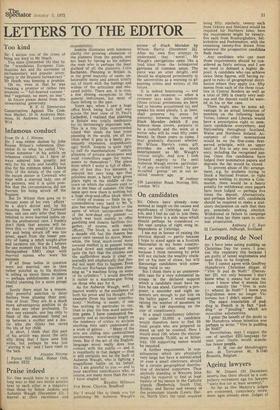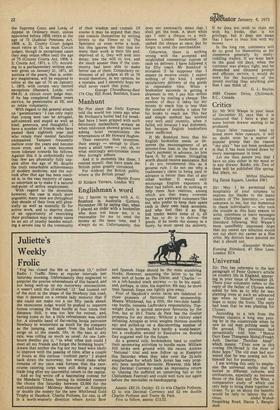Ageing lawyers
Sir: W. Diment (30 December) asserts that there should be a compulsory retirement age for lawyers " sixty-five (or at least seventy)." So far as Her Majesty's judges are concerned, compulsory retirement ages already exist. Judges of the Supreme Court and Lords of Appeal in Ordinary must, unless appointed before 1959, retire at the age of 75 (Judicial Pensions Act, 1959, s. 2). County Court judges must retire at 72, as must Circuit judges, though in exceptional cases they may retain office until the age of 75 (County Courts Act, 1959, S. 2; Courts Act, 1971, s. 17). According to a parliamentary written answer given on January 21, 1971, all justices of the peace, that is, ordinary magistrates, will be required to retire at the age of 70 on January 1, 1973, with certain very limited exceptions (Hansard, Lords, cols 694-5). A circuit court judge may, if he has completed fifteen years service, be pensionable at 65, and so retire voluntarily.
With regard to the general attack on ' gerontocracy ' I can only reply that young men can be arrogant, self-centred and stupid as well as kind, generous, and thoughtful. I have a number of friends who have passed their eightieth year and who retain their mental faculties unimpaired. Tempers frequently mellow over the years and become more even, and a man becomes more tolerant towards his fellows. Against this it is undoubtedly true that few are physically fully capable after the age of 80, despite the truly remarkable achievements of modern medicine, and the outlook after that age has been reached is, in the vast majority of cases, so uncertain as to make it a natural end-point of active employment.
With regard to the seventies, however, the case is much more arguable; many men are throughout that decade of their lives still physically as well as mentally fit for active work, and to deprive them of an opportunity of exercising their profession may in many cases be an act of cruelty besides entailing a severe loss to the community
of their wisdom and counsel. Of course it may be argued that they can console themselves by writing letters to the Times or to The Spectator or even write a book, but this ignores the fact that for many their work is their life and, deprived of it, they will sink into decay, lose the will to live, and die much sooner than if the community had been able to make better use of them. Compulsory retirement of all judges at 65 or 70 would therefore, in my opinion, be a mistake, and I sincerely hope we shall never reach that point.
George Chowdha ray-Best 174 Clay Hill Road, Basildon, Essex


































 Previous page
Previous page